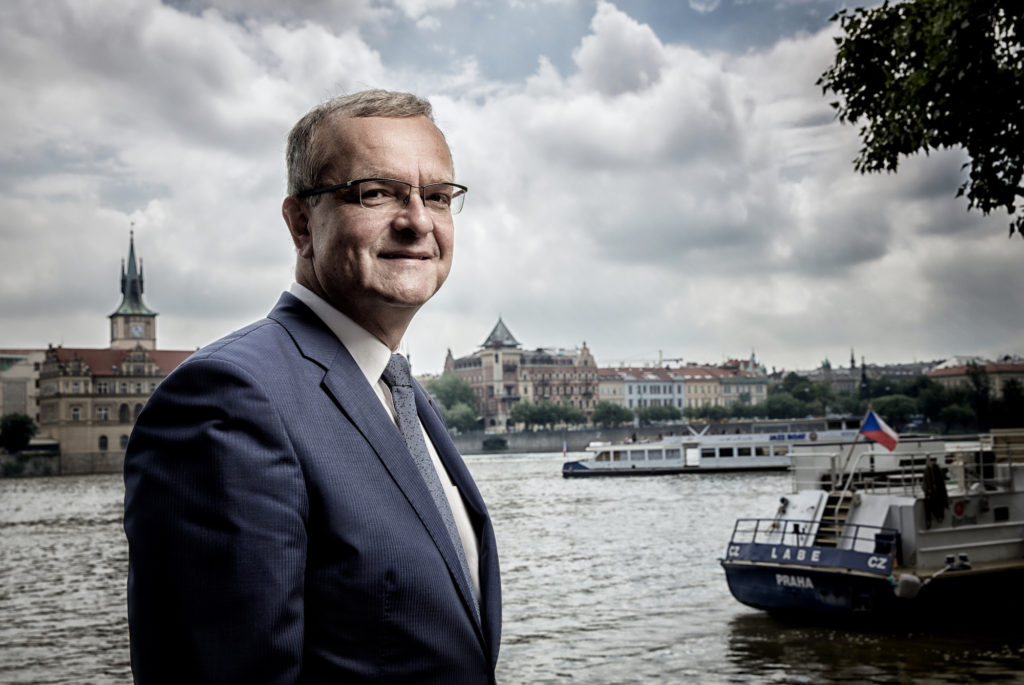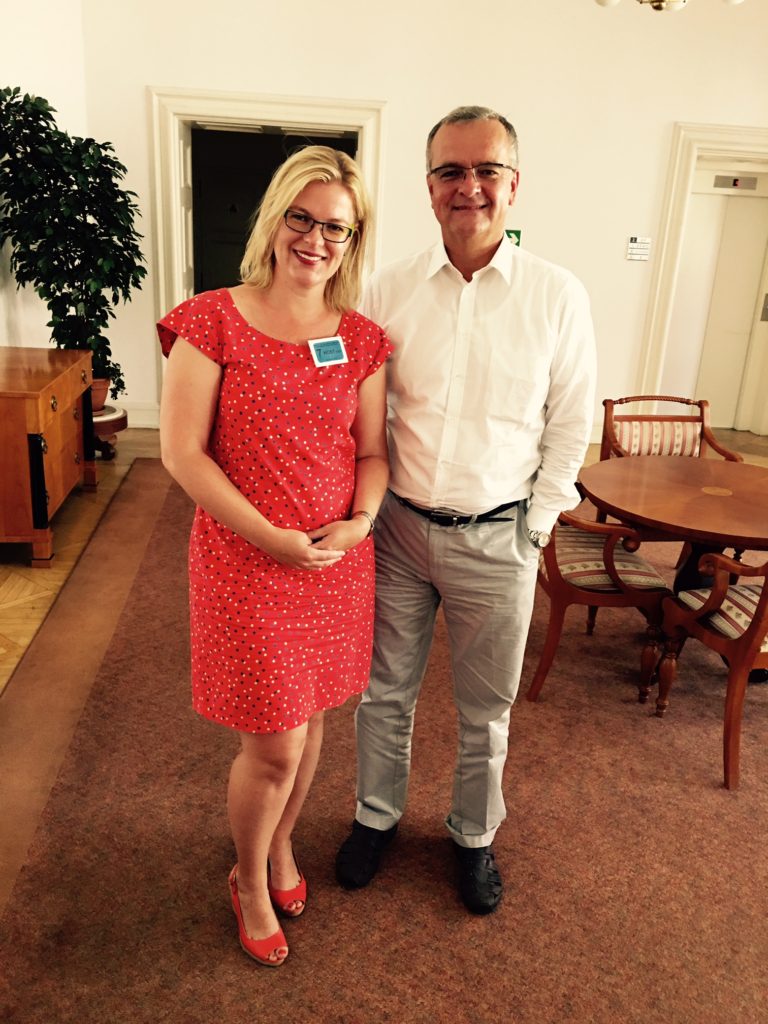(A)political interview about politics from a broader perspective, civic education, leadership and reasons to smile.

Miroslav Kalousek, Chairman of TOP 09,
Photo by: Nguyen Phuong Thao, Reflex
Miroslav Kalousek is one of the most experienced Czech politicians. Since 1990, he has been engaged in the civil service sector. He began as an expert and advisor, and since 1998 he has served in the Parliament. Prior to co-establishing political party TOP 09, he was the Chairman of Christian and Democratic Union – Czechoslovak People’s Party. When Miroslav Kalousek was the Minister of Finance, he was twice named by the Emerging Markets journal the Minister of Finance of the Year 2008 and 2011 for the sphere of developing European economies. Since 2013, the party TOP 09 has been a part of the opposition. He has the reputation for being a very smart and at the same time very tough conversational partner. Personally, I very much enjoyed our interview and he smiled at me from time to time. And being a gentleman, he stood behind me during our picture being taken together, so the height difference would not be too disturbing. Although our interview took place on a sunny summer day, there were some serious topics mentioned that might serve as a warning about possible storm coming and hitting the Czech society.
Mr. Kalousek, after so many years in politics, are you still able to look at politics from an eagle-eye perspective?
Quite the contrary, the older I get and the more experience I have, the bigger chance there is for a broader perspective. On the other hand, it is hard to expect that any active politician pursuing a certain ideology path would be totally objective. But the longer I am in politics, the more I understand the system and I am capable of distinguishing the important issues from the irrelevant ones.
How would you introduce the Czech Republic in 2016 to someone who does not live here and so he or she is not immersed in the everyday political life; such as to an expat manager coming to work in our country?
The Czech Republic is a very happy and a rich country with a stabilised market economy. Economically, we are doing well, but there are some structural risks that will surface sooner or later. The great dependence on the automotive industry might be the first one to mention. We are a democratic country, historically we used to be a satellite country of the former USSR and the in influence of Russian propaganda has been extraordinarily high. The fifth column of Russian propaganda is present at the level of central public offices and institutions. We face the situation when the long time established system of liberal democracy and political parties is to a certain degree threatened by the attempt to raise the level of autocracy and apply the corporate management model.
According to the latest polls, Russian President Putin scores as more popular than German Chancellor Angela Merkel. How do you perceive such result?
I am not surprised but it is very sad news. It reflects a certain intellectual slip in the Czech society that shows our relationships towards the European Union as well as towards Russia. It looks like we have two political representations and two Czech Republics and each of them wants to go the opposite direction. It does not come as a surprise that I am a supporter of the Czech Republic belonging to “the hard-core” of the European Union and fulfilling its membership duties within the NATO. Although it is necessary to include Russia in a dialogue and have the best relationship possible, I still consider Russia being the number one security threat with regards to the international and defence policy.
How come we find ourselves in such a state after almost 27 years since the Velvet Revolution?
Democracy is a system where you make mistakes. Everyone does and mistakes happen as well while you run a country. Our biggest mistake was taking freedom for granted for a long time. Freedom actually fell into our laps after the system fell apart and we did not have to fight for it. Free liberal democratic environment is not a given, we have to fight for it and also nurture it every day. We have managed to set up a standard system of democratic institutions establishing all democratic processes and mechanisms within a short time but we have forgotten to answer the question whether we will have enough democratic people. Unlike West Germany after the World War II, we have underestimated the “civic education”, as it used to be a derogatory subject during the communism. We have not put sufficient effort to make sure that a citizen is aware about the principles of liberal democracy, their own place in the system, own rights but also own responsibility to be able to distinguish early warning signals that might put liberal democracy in danger. In Germany, they have dedicated decades to answering a question about how come that such culturally developed country had turned into a brutal dictatorship. But such process does not happen overnight. It is a sequence, similar to the storm coming. The rain does not start suddenly, clouds come first, followed by the wind and then lightning appears. A society that takes care about civic education is able to identify warning signals in time. However, the Czech Republic is still a country with an unpredictable past. We have spent little time discussing history, particularly finding an answer to the question: “How come we have lost our freedom?”. The answer corresponding to the Czech mentality goes: “It is not our fault, it was someone from outside who is to blame”. But this is not true, quite often we lost our freedom ourselves and I do not want to see repeating it.
What would you have become in case you had not entered politics?
I was not in a position to be able to choose. I come from a little town and when I was 15, I received a report saying that it would be suitable for me to be raised by the working class and so I could only choose between two vocational schools – the one to become a fisherman and the other one having chemical specialisation, the latter offering the possibility of graduation. So after I became a worker myself, raised by the working class, I entered the University of Chemistry and Technology in Prague. In 1990, I got the offer to join the public sector which I declined at first. Had I not joined, I would have probably continued in the career in the chemical industry. However, my dream at the age of 14 was quite different and quite clear. I wanted to go to the agricultural school in Tábor and then Agricultural University and to breed cows. But I was not allowed to attend that kind of a school.
Now, I will ask you as a citizen…What is the central theme for the upcoming fall elections?
We will have two types of elections, regional elections and in some parts Senate elections. Protection of freedom is definitely the strongest and central theme for the Senate elections. We are facing the situation when the government uses both executive and legislative measures to limit freedoms such as freedom of assembly or protection against search and seizures. During the last two years, numerous registers have been created gathering sensitive information about citizens. Such data must not be systematically used in any way, there is no capacity to do so. However, there is a danger that this information might be misused. Such steps have been all written down to create “List of Oppression” and we want to ask voters to gather the majority in the Senate so the list cannot be enlarged; and on the other hand, it can be annulled overtime.

Miroslav Kalousek with Linda Štucbartová, author of this interview
Now, this was an answer from a politician. But how would you answer as a citizen?
I believe I would be an active citizen who does not agree with his rights and liberties being taken away and is willing to do something about it. The quality of democracy and freedom does not depend on the top political leaders, be it Svoboda, Kalousek or Babiš. It is decided by the 70-80% of population, who in reality does not care. The task of politicians is to make sure that the percentage of people who do not care is as low as possible. Having said that, I do not believe that it is only up to the politicians. The engaged intellectual elite has been present throughout the history, both engaged and active and even able to influence it. Now, if there are some elite groups, they are silent.
It seems you have anticipated my next question. As our interview is for the Czech and Slovak Leaders Magazine, let us discuss leaders in the Czech Republic and in Europe.
I will not give you any names, as I feel it is inappropriate, especially prior to the elections. As I have already mentioned, I feel there is a lack of leaders, not only in the Czech Republic but also in Europe. Europe now faces a difficult situation, there is a migration crisis next to the financial crisis and we see various conflicting interests of single member states. I remember times when Europe had much stronger leadership, formed by Kohl, Mitterrand and Thatcher. I have asked myself a question that is rather to be answered by sociologists as to whether the last true leaders were not those of the war generations having experienced borderline situations. These leaders were then replaced by administrators. In good times, administrators are popular, since they are not controversial. In decisive moments, when difficult decisions are to be made and it is necessary to accept a responsibility that can be considered even suicidal, the true leadership is missing.
I have come across your statement at your website: “There is never enough smile, it is a crime not to smile once per day”. So, whom do you smile at and what gives you a reason to smile?
Well, I hope that I have smiled at you… I always make sure to smile at people who work at the reception office. I see how some colleagues enter like a “dead zone” and enter without a greeting. I do not understand this, I believe that even in times I do not feel like it, I should enter with a greeting and smile. Frowning is a part of the Czech mentality but we have many reasons to smile. Despite all the problems we are facing, let me return to the beginning of our conversation when I mentioned that the Czech Republic is a very happy and rich country.
And what are your final words for Czech and Slovak Leaders Magazine readers?
I keep repeating the same message; so my appeal goes like this: “Let us not be indifferent”. I consider our own indifference as the biggest challenge for the Czech Republic. We can have different opinions but let us discuss them, let us put these forward. However, we cannot be indifferent, stop paying attention, be apathetic, keep saying that it does not matter. Because then comes the moment when something happens and it is too late since we have been indifferent for too long. Being an active citizen is not limited to casting a ballot once in four years. An active citizen is continuously very attentive to the course of events and makes himself or herself heard when feeling his or her own rights are being limited.
By Linda Štucbartová

